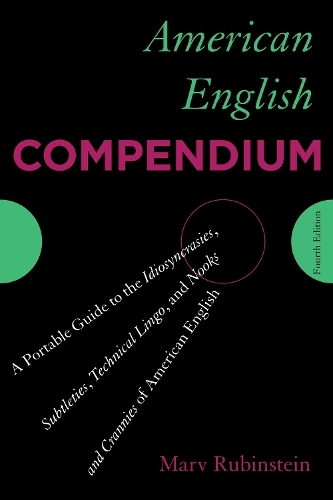
American English Compendium: A Portable Guide to the Idiosyncrasies, Subtleties, Technical Lingo, and Nooks and Crannies of American English
(Paperback, Fourth Edition)
Publishing Details
American English Compendium: A Portable Guide to the Idiosyncrasies, Subtleties, Technical Lingo, and Nooks and Crannies of American English
By (Author) Marv Rubinstein
Bloomsbury Publishing PLC
Rowman & Littlefield Publishers
14th August 2014
Fourth Edition
United States
Classifications
General
Non Fiction
Dictionaries
427.973
Physical Properties
Paperback
542
Width 152mm, Height 229mm
Description
The American English Compendium is a fun way to explore the nuances of the English languagelearn that a group of lions is called a pride; a group of whales, a pod; and a group of owls, a parliament. Distinguish between a quack and a shyster. Learn that tabling a motion in a U.S. court has an opposite meaning from the same term in England. This book picks up where other language dictionaries leave off: it includes common proverbs, a sampling of American English versus British English, popular American expressions and slang, acronyms, and varied information on everything from wildlife to currency. In this new edition, the staples have been updated and fresh chapters have been added, with information on pronunciation, oddball English words, and even some of the new Internet terminology, including Twitterspeak.
Reviews
Rubinstein has assembled a friendly, accessible guide to the nuances, specialized terms, and other 'nooks and crannies' that make American English the vibrant, supple, quirky language it is today. Originally geared to translators, this compendium's audience has broadened over time; it can be used equally efficiently by international students and anyone seeking greater fluency. Since the last edition and the second, both titled 21st Century American English Compendium, the contents have been updated to include new vocabulary, with the acknowledgment that slang can quickly fall out of favor. The volume's organization is somewhat idiosyncratic, with separate chapters for popular expressions, proverbs, similes and metaphors, colloquialisms by category (animals, sports, food and drink, and the like), currencies, and common words and phrases from medicine, law, and business. Of particular usefulness is the coverage of British-American terminology differences and words from foreign languages appearing in English.. . .[I]t provides a wealth of up-to-date material on American-flavored English in a handy format. Summing Up: Recommended. Lower-division undergraduates and above; general readers. * CHOICE *
Intended for translators, interpreters, writers, editors, and advanced students of language who are looking for explanations of American words, phrases, proverbs, expressions, and jargon, Rubinsteins (emeritus, English; Monterey Inst. of International Studies; 21st Century American English Compendium) resource fills the gap between the emergence of new words and their inclusion in standard dictionaries. This updated edition includes current Americanisms with explanations based upon cultural differences or 'knowledge of the historical, literary, and cultural background of Western civilization.' The chapters on proverbs and popular American expressions contain similar, identical, and contradictory proverbs and expressions, including foreign-language words and phrases (Arabic, Chinese, French, German, Hebrew, Italian, Japanese, Korean, Latin, Norwegian, Russian, Spanish, and Yiddish) commonly appearing in American English. Entries also indicate whether a literal translation is acceptable. Slang and colloquialisms are organized by topic. Other chapters cover odd words (e.g., 'B4' for 'before'), retronyms, contronyms, neologisms, measurements, abbreviations (e.g., 'tnx' for thanks), acronyms, colors, currencies, and tech-related words. The index will include key words for proverbs, expressions, similes, and slang. . . .[T]he strength of this book is that it offers a guide to the most common, current, technical, idiosyncratic American proverbs, slang, and colloquialisms in a single, portable volume. Summing Up: More than a standard reference title, this work provides a fascinating look at the American English language and will also do well in circulating collections. * Library Journal *
Author Bio
Marv Rubinstein is a nonagenarian who has worked in many professional fields. Among other things, he served as an adjunct professor at the Monterey Institute of International Studies in Monterey, California, teaching a course called Quixotic English to translation and interpretation students. His writing has appeared in the New York Times, the Japan Times, the Village Voice, and many other publications. He lives in New York.
